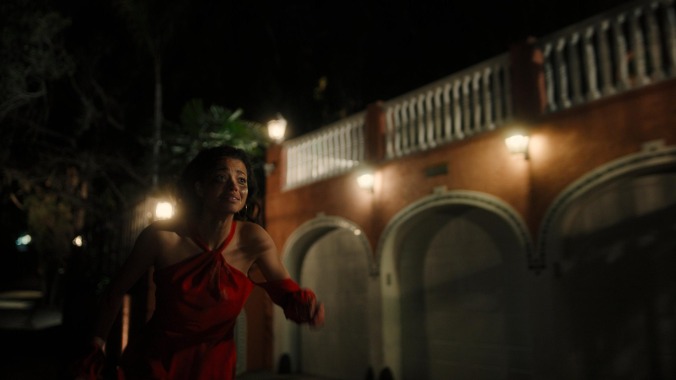The timely and stylish horror thriller Run Sweetheart Run trips over its metaphors
Shana Feste’s stylish direction and well-observed script make for a thoughtful and relatable nightmare that lacks scares

True to its title, the first half hour of Run Sweetheart Run is a game of catchup. We meet Cherie (Ella Balinska), a single mother and aspiring lawyer pushed into a client dinner. The details of her life are an afterthought, forced out of our purview by the demands of her powerful boss, James (Clark Gregg). Having to find a babysitter on short notice, Cherie rushes home to her adorable toddler, dropping her last tampon down the toilet. Not only will she have to spend the next 100-minute horror movie on her period, but she will also have a serious plumbing problem if she survives.
Cherie is focused and attentive, an ambitious woman facing the everyday minefield of being a black woman in a hostile patriarchy. She knows better than anyone that complaining about lechers on the bus won’t get you anywhere. It’s a point the movie constantly makes—“Nobody cares.” And yet, the film doesn’t feel as pessimistic or as cynical as that. Run Sweetheart Run comes from a well-observed point of view that roughly 50% of the world’s population shares. But its singular focus is shortsighted, holding the movie back from delivering effective scares.
Run Sweetheart Run’s setup is familiar. Cherie meets the client, Ethan (Game Of Thrones’ Pilou Asbæk), at his palatial home. He’s supposedly a natural charmer, even if Asbæk isn’t, pouring Cherie a gin and tonic that’s 90 percent gin and taking her to the best sushi place in town. Ethan really doesn’t like dogs, but that’s not a deal breaker, and our heroine swoons. Cherie accepts his invitation for a nightcap as long as he wakes her up by daybreak.
Wherever you think that’s leading, Run Sweetheart Run makes a beeline toward the unexpected, though not always successfully. As Ethan leads Cherie into his home, he breaks the fourth wall and stops the camera from entering. He knows the intended audience for this type of movie and what they expect to see. Director Shana Feste has other plans. From outside his door, we hear Cherie beg and scream until she flees.
Her escape kicks off an L.A. walking tour reminiscent of The Terminator and Collateral, where the sights are either a blur or a hiding spot as L.A.’s homeless encampments foreground the city’s inhumanity. Cherie ends up in front of a movie theater pleading with two white women to help her. Of course, they call the police, who arrest Cherie. Sweetheart observes how too often, state protection is for powerful white men, and Ethan’s got them bought and paid for.
The well-intentioned Run Sweetheart Run weaponizes the sexist realities forced upon women. However, like Smile, a similarly metaphor-heavy horror hit, Sweetheart trips over itself to keep the allegory going, turning elements like Cherie’s menstruation into a plot contrivance. As she escapes the police station, Rob Coudert’s synth-heavy score is in John Carpenter mode. It’s an appropriate choice, but Carpenter always knew the message was meaningless without the scares. Cherie’s actions, like tossing a tampon to throw Ethan off her trail, don’t empower her much as they get the plot to the next stage. Unfortunately, the audience gets lost trying to figure out the one-for-one of Feste, Keith Josef Adkins, and Kellee Terrell’s script, and it’s a hurdle the film can’t clear.
Despite the screenplay’s shortcomings, Balinska grounds the film in emotion. Shrugging off the advances of the creeps in her orbit that keep her at a 10, the actor finds new places to take her fear and strength, whether she’s taking a bleach wipe shower or facing the unholy terror of Ethan’s proper form. The miscast Asbæk fares slightly worse. Known mainly as the limitless monster Euron Greyjoy on Game Of Thrones, the actor doesn’t have suitable charm to insulate his wolf in sheep’s clothing. An awkward rollerskating scene tests the limits of watching him have fun on screen. Asbæk’s unpredictability is his secret weapon, and he’s disarmed here.
And yet, it doesn’t matter to the plot because he doesn’t need charm. Like every other C-suite exec in the movie, James can’t believe Ethan would act this way. However, his wife Judy (Betsy Brandt) knows the score. She can spot a would-be “nice guy” from a mile away, and this connection binds the women, as well as the movie’s message that public transportation can be many individuals’ literal lifeline in a city where only the most powerful are protected.
Run Sweetheart Run is the product of someone with an eye for image-making. With the low-light, orderly aesthetic of David Fincher, Feste’s camera gorges on whatever it can glean from the streetlights of Sunset Blvd. A first-timer in horror after dramas like Boundaries and Country Strong, Feste makes a solid commitment to red and green motifs and street-level cinematography, but unfortunately doesn’t convey their menace.
Run Sweetheart Run moves at an Olympian’s pace for a hermetically sealed thriller, but it allows less room for the audience to engage than it does to merely observe. Keeping audiences at a distance—watching and empathizing with Cherie, but never building suspense regarding her survival—Run Sweetheart Run loses its breath long before Cherie’s story arrives at its ludicrous conclusion.